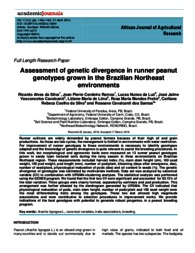Assessment of genetic divergence in runner peanut genotypes grown in the Brazilian Northeast environments.
Assessment of genetic divergence in runner peanut genotypes grown in the Brazilian Northeast environments.
Author(s): SILVA, R A. da; RAMOS, J. P. C.; LUZ, L. N. da; CAVALCANTI, J. J. V.; LIMA, L. M. de; FREIRE, R. M. M.; SILVA, C. R. C. da; SANTOS, R. C. dos
Summary: Runner cultivars are widely demanded by peanut farmers because of their high oil and grain productions. As those are late cycles, the management is limited in environments with water restriction.For improvement of runner genotypes to these environments is necessary to identify genotypes adapted and the knowledge of genetic divergence is quite relevant to assist the breeding procedures. In this work, ten morphological and agronomic traits were measured on 13 runner peanut genotypes grown in sandy loam textured soils during the rainy season in three environments on Brazilian Northeast region. These measurements included harvest index (%), main stem height (cm), 100 seed weight, 100 pod weight, pod length (mm), number of pod/plant, blooming (days after emergence, dae), number of seed/plant, physiological maturation of pods (dae) and oil content in seeds (%). The genetic divergence of genotypes was estimated by multivariate methods. data set was analyzed by canonical variable (CV) in combination with UPGMA-clustering analyses. The statistical analysis was performed using the GENES program. We found that the first two CV were significant and accounted for 82.13% of the total variation. Three groups were clearly formed, separated by earliness and pod production. This arrangement was further attested by the dendrogram generated by UPGMA. The CV indicated that physiological maturation of pods, main stem height, number of pods/plant and 100 seed weight were the most differentiating traits among the genotypes. These two last allowed high magnitude associations and were contributive to selection procedures in improvement works. We provide indications of the best genotypes with potential to generate robust progenies, in a peanut breeding program.
Publication year: 2016
Types of publication: Journal article
Unit: Embrapa Cotton
Keywords: Amendoim, Arachis hypogea L, Breeding, Canonical variables, Genotipo, Traits associations
Observation
Some of Embrapa's publications are published as ePub files. To read them, use or download one of the following free software options to your computer or mobile device. Android: Google Play Books; IOS: iBooks; Windows and Linux: Calibre.
Access other publications
Access the Agricultural Research Database (BDPA) to consult Embrapa's full library collection and records.
Visit Embrapa Bookstore to purchase books and other publications sold by Embrapa.

